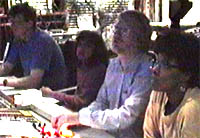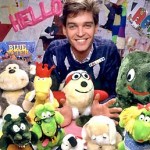I gradually got to know the promotions people, they were friendly and treated the crew as part of the team. I, like a good number of other cameramen, thought “I could do that”. Promotions didn’t need specific knowledge of a subject, like science, or theatre experience like drama. It needed a knowledge of tv and programmes, and some practical abilities, as the producers and assistant producers did their own vision mixing and had to be close to the technology in lots of other ways.
“I can do that – gissa job”. But they wouldn’t.
There was in those days a system called attachments, where once a year you could apply to join another department for a six months trial period. You could also do an informal short mini-attachment, if you asked loudly enough. I applied for the former and didn’t get an interview, but I did get the latter, and made a trail for the first episode of Happy Ever After, which later became Terry and June. It went all right, and I applied for the big attachment again. This time I got an interview, and I was complete rubbish – all my fault.
I asked a successful attachee – “How did you get in?” “Well, after I left Oxford I wasn’t sure what to do…” and blah blah blah. What hope, I felt, had Bernie from Watford Technical High School? I started in on an OU degree.
Meanwhile, being a cameraman was going ok. I was having good fun, and people seemed to be happy with what I was doing down there on number 5. I couldn’t let the Pres thing go though, and applied just for the hell of it for a third time. This time I went to the board straight from the studio, where I needed to return. I wore my jeans instead of my suit, and told them what I thought, not what I thought they wanted. I didn’t care that much any more.
They gave me the attachment. I was amazed. A few weeks later I left the big studios and started in on learning to be a network director – putting the programmes on the air, the most edge-of-the-seat scary job in television without going to a war zone. The only job where after doing five minutes incredibly intense work, one felt a strong desire to go next door to the convenient conveniences.
Pres had a much smaller staff and a rather higher turnover than cameras. It was generally expected that once in, you would almost certainly stay, and so it happened for me. I was far from finishing the attachment when they gave me the job, and I had an embarrassing moment when a Pres Editor scheduled me to network direct BBC2 and I had to say that I hadn’t actually been trained on that yet. My colleague on BBC1 had to keep popping over with helpful hints. Very scary.
So, in 1977, my career moved on. A Pres assistant producer was on a higher grade than a senior cameraman, so I had leapt a bit up the ladder. At that time we also were given a free colour tv, which I couldn’t have afforded before. We worked on one of four teams working a four week cycle, three on and most of one off. I was often the BBC2 person, which meant I made the trails and then directed the network for a week. The off week tended to start off in a bit of a  sleepy blur. The big disadvantage of being Bernie the degree-lacking cameraman went away as soon as I had the job, and I didn’t in any case have time, so the OU was dropped. I still don’t have that degree, though these days I teach university students. The advantage of having by then eleven years in tv came to the fore, and I was promoted to producer, with my own team, in under three years, the fastest ever at the time. Being a cameraman had at last given me a major boost.
sleepy blur. The big disadvantage of being Bernie the degree-lacking cameraman went away as soon as I had the job, and I didn’t in any case have time, so the OU was dropped. I still don’t have that degree, though these days I teach university students. The advantage of having by then eleven years in tv came to the fore, and I was promoted to producer, with my own team, in under three years, the fastest ever at the time. Being a cameraman had at last given me a major boost.
Through most of the 1980s I worked away at making trails. It was a demanding treadmill – we worked a lot of hours under heavy pressure with little budget. Every cycle each person would make around 12-15 trails, with a number of versions of each (tomorrow, tonight etc).
song contest
No Description
(A trail for the Buck’s Fizz Eurovision Song Contest entry, which they won. My wife Pauline, who wasn’t my wife then, was the PA. She’s hiding behind the balustrade in the wide shot of the house)
There’d be great trails, good ones, and ones you really wanted to forget – but the good thing was that things moved very quickly, so if you screwed up you didn’t have time to worry too long. I’d tell my team that if they could manage one original idea each cycle they were doing well.
The trail I’m still most proud of was for a James Burke series about the nature of reality. I really did have the idea in the bath – I used video trickery to get three James Burkes on the screen at once talking to each other, with the third one explaining that none of them were real. I still (just) have a copy, which started on 2″ tape, was copied to Philips, then to VHS and now on the computer and DV tape.
The trail making process required us to spend a lot of hours in VT and in our studio, Pres A. We’d often spend a few hours in the bar unwinding afterwards. These days one can find commentaries on the internet which include words like “the BBC decided…” which actually started as a slightly drunken idea in the small bar at Television Centre. BBC trails from those days look pretty crude by modern standards, but I rather think that we did as well at gaining an audience on our tiny budgets as do modern very expensive trails. Diminishing returns set in during the nineties.
We did other things too – I spent a few months producing Points of View with Barry Took. In those days all the letters were on real cardboard captions, and the assistant producer who was vision mixing and the scene crew who did the changes worked very hard during the recording which was done without a break. Barry would sometimes put in captions with one word on – very tricky. I had done the vision mixing bit earlier, as an assistant producer – 1,2,3,2,vt,1,2,3,2, etc very quickly – but as producer I just had to sit there and make pronouncements.
Another thing that came our way was Children’s BBC, and I’m the proud inventor of what  was eventually named The Broom Cupboard, manned by Phillip Schofield.
was eventually named The Broom Cupboard, manned by Phillip Schofield.
BBC Breakfast Time went on the air in, I think, 1982, and they wanted a tv features producer from Pres. I was the third person to go there, and by that time the excellent editor, Ron Neill, had seen all the behind the scenes stories, and wasn’t gripped by what we had to offer any more. I made my first current affairs film about eating breakfast on a big film location, which was dropped for not being good enough. This is what traditionally happens – a new director puts their whole being into their first film which is then trashed by the editor. New director goes off very unhappy. Luckily(ish) for me, my film was dropped by Ron Neill, who explained why in a kind manner. I made sure I didn’t get dropped again. I enjoyed Breakfast Time. They didn’t want much in the way of tv features, but they did need film directors, so I got to do a range of different stuff, just because I could and was available. I became a whole lot better at making four minute films.
A – possibly apocryphal – story said that Michael Grade bought Roland Rat at some extravagant rate when he was Controller 1. Grade then had to find programmes for him to get the money back from programme departments, and I was given the joyful job of producing one of them one of them – Roland Rat’s Easter Extravagaza. My then boss said that Mr Grade wanted the Rat to take over the Broom Cupboard from Philip Schofield, and this was the compromise . Don’t know if that is true either.
RREE was basically links to kids shows. There was no studio but we were offered the use of the EastEnders OB truck on off days. We used the old ATV/Central VT/TK area at Elstree as the rat’s underground control room. ATV had take away the actual machines, but left monitors and bays etc. The BBC had been there a few years but hadn’t touched the place. I powered up a monitor or two and they worked so they and some bits and pieces were the set.
The rat – David Claridge – was an interesting person, as are many puppeteers. A couple of year later I was the rat’s right hand in Pres B when David’s partner hadn’t turned up. Not too many people can say they’ve been Roland Rat’s right hand live on BBC1.
In the wider BBC world the good old days were gradually drifting away. Television Centre had been built by a post war management as an efficient programme making factory, and through the sixties and early seventies it was just that. Every studio worked every day, and a gap was always slightly surprising. But most BBC managements are bigger on playing politics than making efficient use of plant and staff. “Regionalisation” was “very important”, and so more studios were built around the country. There weren’t any programmes to put in them, so some were diverted from London – the efficient factory was no more, and Television Centre began its long sad decline. At one point I made a trail for Howards’ Way, and met up with producer Gerry Glaister at a boat yard near Southampton. His view of regionalisation, in which he rehearsed his London-based cast in London, the scenery was built in London, his office was in London, but they all had to go to Birmingham for two days a week in the studio just to get the words “BBC Birmingham” on the end of the programme whilst studios stood empty in London – well, you can imagine.
Margaret Thatcher decided that a large proportion of BBC programmes had to be made by independents. This meant that the accountants had to put prices on everything so that the independents could price their programmes. Unfortunately it just isn’t possible for a body like the BBC to run as lean a ship as a company that just owns studios, so the independent programmes were made in what had been ITV studios. Television Centre became quieter and quieter, despite its excellent facilities and situation.

